CNC Machining for Plastics
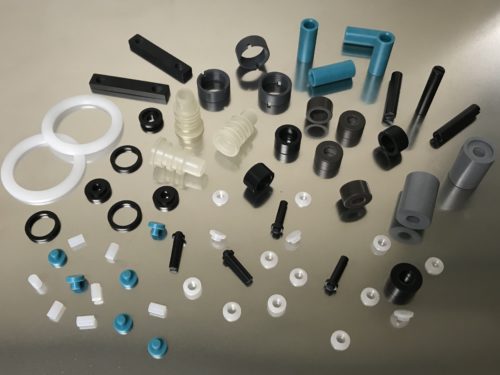 Since 1979, MF Engineering has been manufacturing high-precision components for various industries, including those based in electronics, biomedical, and defense. Relying on customers to supply their uniquely engineered drawings, an experienced team designs and manufactures the highest quality custom machined plastic parts available, exactly to customer specifications.
Since 1979, MF Engineering has been manufacturing high-precision components for various industries, including those based in electronics, biomedical, and defense. Relying on customers to supply their uniquely engineered drawings, an experienced team designs and manufactures the highest quality custom machined plastic parts available, exactly to customer specifications.
CNC Machining Capabilities for Plastic Parts
With a highly skilled team of dedicated employees, MF Engineering strives for continuous satisfaction in both quality and service by meeting and exceeding customer expectations. At MF Engineering, we supply many industries with expert-level manufacturing of miniature to medium-sized parts while still maintaining space-grade dimensional tolerances. Furthermore, with machining capabilities including CNC Swiss Machining, CNC Milling, and CNC Routing, MF Engineering can provide services for any custom machined plastic needs.
Swiss Machining
CNC Swiss machining has increased in popularity over the past few years because the process produces high-quality precision plastic parts in high volumes with more accuracy and less downtime than many other methods. Once considered a specialty process, technological advancements have made CNC Swiss machining a common method used by many CNC machine shops. The Swiss CNC machining capabilities at MF Engineering can serve as the perfect option for larger production runs, but also for smaller runs with as few as five pieces.
CNC Milling
CNC Milling is the process of machining plastic parts from a solid piece of plastic by removing excess plastic through the use of rotating cylindrical tools called milling cutters, all contained within a spindle. Each cutter varies in size and function, enabling the machine to mill the plastic across the different axes and cut different angles. Computer-controlled CNC milling machines can move along as few as two axes and as many as five to machine plastic parts with precision.
CNC Routing
Controlled by a computer, a CNC routing machine cuts various plastic sheets to any shape and size, creating highly intricate designs. These machines handle softer materials such as plastic very well. A CNC router can cut much quicker than a CNC milling machine, making this an optimal choice for providing consistency from item to item on simpler designs.
Materials
MF Engineering can produce custom-machined plastic parts from several different types of plastic to match the specifications of our clients.
Delrin
Polyoxymethylene—more commonly known by the brand name Delrin—is a popular thermoplastic due to its high wear and impact resistances. Delrin is highly stable and machining within tight tolerances is relatively straightforward, which makes it ideal for producing very stiff, low-friction parts.
HDPE
High-density polyethylene is versatile thermoplastic polymer with a very high tensile strength very near that of concrete and a high impact resistance. It is commonly used to create plastic bottles and jugs used for everything from milk to shampoo. HDPE is also a very popular material for commercial plastic pipes. Since it is commonly available in a variety of stock forms, it is an ideal material for subtractive CNC machining processes.
PVC
A wide range of industries rely on PVC plastic for custom-machined plastic parts. As a strong, durable, lightweight material that resists weathering, rot, corrosion, impact, and abrasion, PVC works well for construction and outdoor applications because of its long life span.
Nylon
Nylon performs well as a material for custom-machining bearings and insulators, as well as for parts exposed to measurable amounts of water. Additionally, nylon has very low friction properties which make it extremely easy to mill. The automotive industry depends on this critical material for parts ranging from door handles to radiator grills.
Teflon
Polytetrafluoroethylene (PTFE)—most frequently referred to by the Dupont brand Teflon®–tolerates high temperatures, resists most chemicals, and has good electrical insulation properties. Teflon is very dense but also very soft, so it requires extremely sharp and precise tools to machine accurately.
Fiberglass Reinforced Plastics
Fiberglass reinforced plastics (FRP) are composite materials made of a polymer matrix reinforced with fiberglass. Because of the bonds formed from the fine glass fibers woven into it, this material offers a wide range of strength and flexibility. FRP is easily moldable and lightweight, with a very high strength-to-weight ratio.
Polycarbonate
Polycarbonate is a thermoplastic polymer that contains carbonate groups in their chemical structures. Unlike most thermoplastics, polycarbonate stays highly resistant to breaking or cracking. The material can be transparent and maintains extreme durability, excellent impact strength, and good machinability.
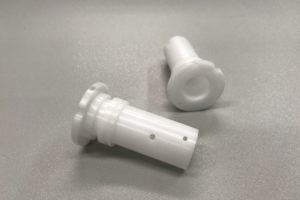
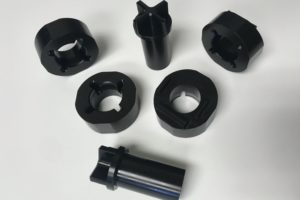
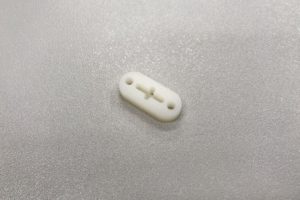
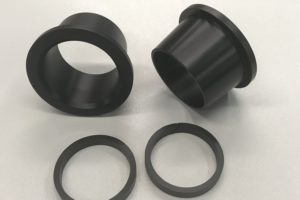
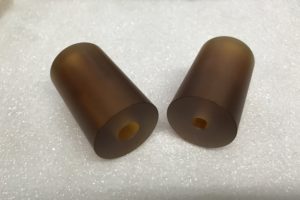
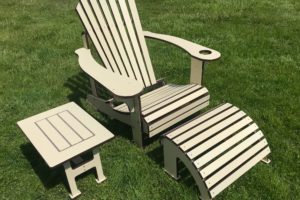

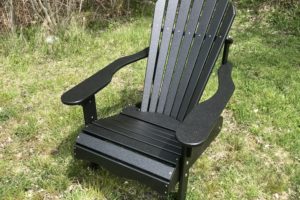
-
Processes/Services
- Assembly
- Turning
- Contour
- Form
- Taper
- Straight
- Milling
- Drilling
- Deep Hole Drilling
- Boring
- Threading
- External
- Internal
- Tapping
- Thread milling
- Knurling
- Broaching
- Counterboring
- Countersinking
- Pressing
- Profiling
- Corner rounding
- Edge breaking
- Reaming
- Parting/cutting
- Facing
- Part marking
- Dot Peening
Outside Secondary Services
- Laser engraving
- Centerless grinding
-
Equipment
CNC Swiss Machinery
- Automatic bar feeders
- Milling
- CAD design services
- Cam programming services
- Reverse engineering
- Machinery Axis: Up to 12, live tooling, C-Axis
- Part dimensions
- Min: .030in, .76mm
- Max: 1.250in, 32mm
- Part Length
- Min: .020in, .5mm
- Max: 36in, 915mm
- Tolerances
- Straightness: .001
- Concentricity: .0005
- Diameter (outer/inner): .0002in/.005mm
CNC Vertical Machining Center
- Milling
- CAD design services
- CAM programming services
- Reverse engineering
- Machinery Axis: 3 – 4
- Max. part dimensions:
- Length: X 26″
- Width Y 14″
- Height Z 12″
- Tolerances:
- +/- .001″ for length, width, and height
CNC Turn Mill- CNC Turn-Mill Lathes
- Main & Sub Spindle Machining
- CNC Control Capabilities
- Bar Feed Max. 2”
- Chucking Max 8”
- Milling
- Cad Design Services
- CAM Programming Services
- Reverse Engineering
CNC Router Table and Portable 3D Digital Templating Digitizer- Multi-hole drilling (9-position drill bank)
- Aggregate head for horizontal machining
- CNC control capabilities
- Milling
- CAD design
- CAM programming
- Reverse engineering
- Machinery axes: 3 + Live tooling
- Tolerances: +/- 1/16″
-
Industries Served
MF Engineering serves a wide range of industries and unique applications, such as:
- Aerospace
- Agricultural & Farming
- Automation
- Automotive
- Banking Systems
- Biomedical
- Biopharmaceutical
- Biotechnology
- Chemical
- Commercial
- Computer
- Dental
- DOE
- DOD
- Electrical
- Electronics
- Food Processing
- Government
- Heavy Equipment
- HVAC
- Hydraulics
- Ice Manufacturing
- Industrial Equipment
- Injection Molding
- Laboratory
- Machine Tools
- Machinery
- Manufacturing
- Marine
- Material Handling & Processing
- Medical/Medical Devices
- Medical Devices
- Metrology & Inspection
- Military
- Mining
- Nano Tech
- Nuclear
- Oil & Gas
- Optical
- Pneumatics
- Power Generation
- Printers (Rolling/Feeding Machinery)
- Pumps
- Railroad
- Renewable Energy
- Robotics
- Semiconductor
- Specialty Machinery
- Telecommunications
- Textile
- Tool & Die
- Transportation
- Universities
- Vacuum Electronics
- Valves
-
Equipment
CNC Turn Mill
- CNC Turn-Mill Lathes
- Main & Sub Spindle Machining
- CNC Control Capabilities
- Bar Feed Max. 2”
- Chucking Max 8”
- Milling
- Cad Design Services
- CAM Programming Services
- Reverse Engineering
CNC Router Table and Portable 3D Digital Templating Digitizer- Multi-hole drilling (9-position drill bank)
- Aggregate head for horizontal machining
- CNC control capabilities
- Milling
- CAD design
- CAM programming
- Reverse engineering
- Machinery axes: 3 + Live tooling
- Tolerances: +/- 1/16″
Machining vs. Molding of Plastic Parts
While both deal with producing plastic parts, machining plastic components and producing plastic parts through injection molding differ in many ways. The injection process uses molten plastic forced into a mold to shape a piece before cooling and hardening it into a finished product, while the process of machining removes plastic from a solid block until a part takes its final desired shape.
The costs associated with the two processes can vary depending on the project, but injection molding typically has a higher upfront cost associated with it. While injection molding may be more cost-effective for some higher volume applications, the process relies upon the creation of a mold which, depending on its complexity and size, may cost anywhere from a few thousand to a few hundred thousand dollars to make. Smaller orders call for machining rather than injection molding because of that initial mold creation cost.
The machining of plastic parts is also more versatile than injection molding. If changes to the specifications of the piece are required during production, injection molding requires a new mold to accommodate the new design. CNC machining allows for design changes to the part without incurring an added expense.
More precise than injection molding, CNC machining produces higher quality parts with closer tolerances, better surface quality, and fewer cosmetic imperfections.
CNC Plastic Machining From MF Engineering
At MF Engineering, our state-of-the-art facilities come equipped with the most technologically advanced CNC plastic machining equipment available. Coupled with a highly skilled team of engineers and machinists committed to providing the highest quality custom machined plastic parts available, MF Engineering ensures the highest level of customer service and product satisfaction. To learn more about the machining services we offer at MF Engineering, please contact us or request a quote today.

